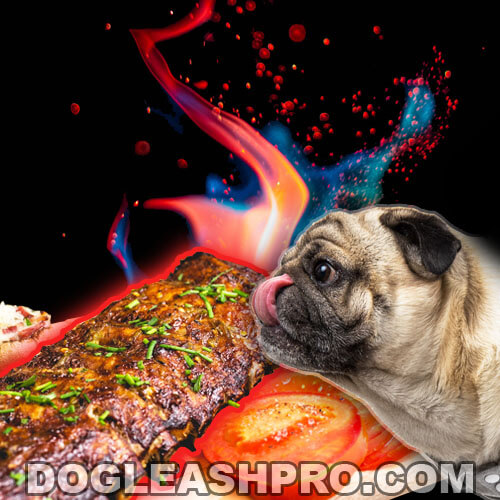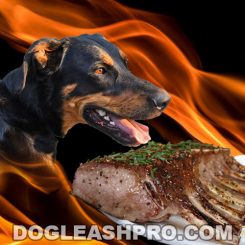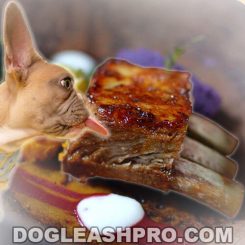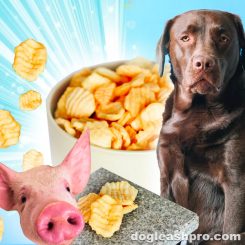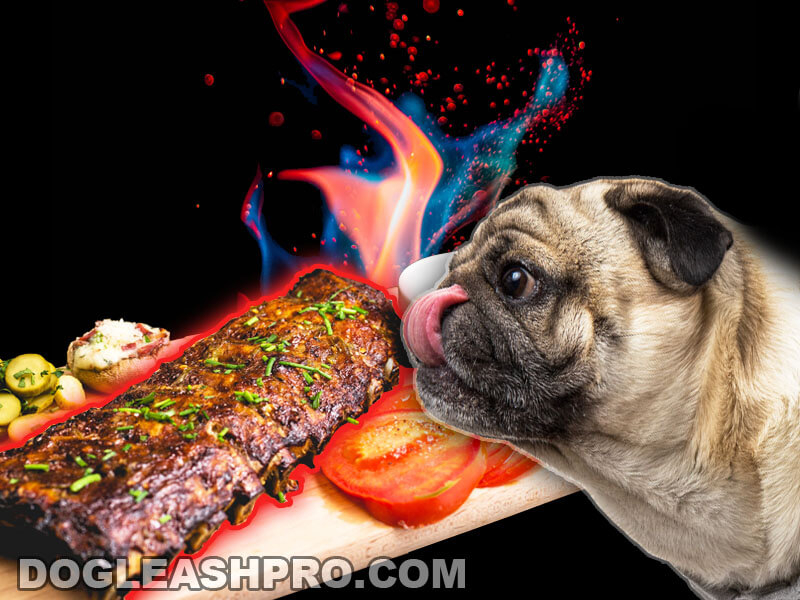
If you have leftover Pork Rib Bones, can you give your dog a Pork Rib Bone? As dog owners, we tend to share a lot of our food with our canine companions. Unlike Beef Rib Bones, Pork Rib Bones are smaller in size with higher fat content in the muscles near the bones. So, is it safe to give dogs Pork Rib Bones? Here’s the short answer first.
Can dogs eat Pork Rib Bones? No, dogs should not eat raw or cooked Pork Rib Bones. Raw Pork Rib Bones may potentially be coated with bacteria, contaminants, and salmonella. Cooked Pork Rib Bones can easily splinter into shards that can tear your dog’s mouth, lips, tongue, and throat and cause bleeding. Since Pork Rib Bones are smaller, they can be a choking hazard and cause intestinal blockage.
In this article, we’ll provide a list of reasons why it is not a good idea to give our furry friends Pork Rib Bones, no matter if the bones are cooked or raw. We’ll also discuss safer alternatives for your dogs if they love to chew or are heavy chewers. Keep reading to find out.
Table of Contents
Can dogs have Pork Rib Bones?
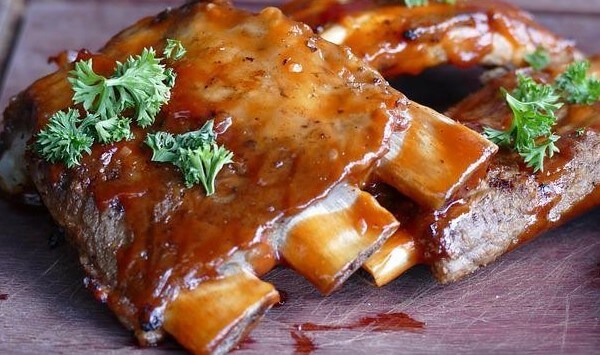
If you’re wondering, “Can dogs have Rib Bones from Pork?” the answer is no. While sharing your leftover Pork Rib Bones may seem like a harmless idea, you could be putting your canine friends at risk of potential health issues.
Dogs should not have Pork Rib Bones for many reasons. Below, we’ll discuss the various reasons why it’s not a good idea to share raw or cooked Pork Rib Bones with your four-legged friends.
Are Pork Rib Bones safe for dogs?
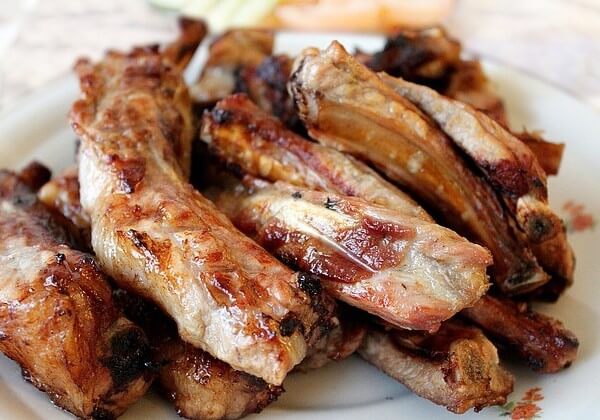
Pork Rib Bones are not safe for dogs. Dog owners should avoid sharing Pork Rib Bones with their furry companions. It doesn’t matter whether the Pork Rib Bones are raw or cooked, both options are off-limits.
Any Pork Rib Bones from table scraps should also be thrown away immediately. They do not make good doggy treats and our four-legged friends should avoid them at all times.
In the next section, we’ll discuss why Pork Rib Bones are bad for dogs.
Are Pork Rib Bones bad for dogs?
Yes, Pork Rib Bones are bad for dogs. Here’s why:
1. Pork Rib Bones can be a choking hazard for dogs
Whether you’re giving your furry friends raw or cooked Pork Rib Bones, allowing your dogs to chew, gnaw, or eat them can lead to serious consequences like choking.
That’s because Pork Rib Bones are smaller and when your four-legged friends chew them, they will become smaller pieces. These small pieces can get lodged in your dog’s esophagus or throat and block his windpipe. As a result, your pooch may choke.
If your dog does manage to swallow the smaller pieces of the Pork Rib Bones, they could potentially get stuck in your dog’s intestines as well. This can lead to intestinal blockage and bowel obstruction. Your pooch may experience excruciating constipation.
If you notice this, contact your vet right away and bring your pooch to your nearest dog emergency hospital. When small pieces get stuck in your dog’s intestines or stomach, they are known as foreign bodies and it may require emergency surgery to remove the pieces that are causing the blockage.
RECOMMENDED: Can Dogs Eat Pig Feet?
2. Cooked Pork Rib Bones can easily splinter and cause internal bleeding in dogs
When dogs are chewing on the Pork Rib Bones, there’s a high likelihood that the bones will splinter into sharp shards. This can occur whether the Pork Rib Bones are cooked or raw.
That’s because Pork Rib Bones are softer so they splinter easily.
Our K9 friends don’t know any better and will continue to chew the bones with the splinter. As a result, the splinter will start to scratch or cut your dog’s lips, tongue, and mouth and this will lead to bleeding. In some cases, the splinter may even scratch your dog’s nose.
Try to keep the Pork Rib Bones as far away from your furry friends as possible. If your fido does manage to steal a Pork Rib Bone and is chewing it, remove the bone from his sight as soon as you can. It’s best not to risk any bleeding around your dog’s mouth, lips, and nose.
Additionally, when dogs accidentally swallow the sharp shards, they may start to gag. The sharp edges of the shards will also tear your dog’s esophagus and throat lining and cause internal bleeding. This is often harder for owners to see and detect which is why it is even more dangerous.
See also: My Dog Keeps Hiccuping And Swallowing (Causes, Symptoms & Treatments)
If the sharp splinters or shards do manage to make their way down to your dog’s stomach and intestines, they could also tear or puncture the stomach and intestinal lining as well and cause internal bleeding.
This requires immediate medical attention and emergency surgery. If this isn’t taken care of immediately, it could be fatal.
As we can see, giving your pooch Pork Rib Bones puts him at risk for choking and severe health consequences as well as an unexpected expensive veterinary visit you didn’t plan or budget for.
3. Raw Pork Rib Bones may contain bacteria, salmonella, or other contaminants
In addition, the Pork Rib Bones may be coated with bacteria, salmonella, and other contaminants. Dogs infected with salmonella can become carriers of the bacteria and may infect others.
Signs and symptoms of salmonella infections include the following:
- Vomiting.
- Frequent and bloody diarrhea.
- Fever.
- Loss of appetite.
- Abdominal pain.
- Lethargy.
If you suspect your K9 friend has salmonella infections or other bacterial infections from eating or chewing the raw Pork Rib Bones, contact your vet immediately.
Additionally, the meat on the raw Pork Rib Bones may carry roundworm called Trichinella spiralis, which can lead to Trichinosis in your dog. It’s important to note that Trichinellosis or Trichinosis is a parasitic disease and unfortunately, it can be transmitted to people.
Don’t miss: White Specks in Dog Poop (Not Moving): What Should You Do?
Dogs with Trichinosis or Trichinellosis infection may experience the following signs and symptoms:
- Myalgia.
- Anorexia.
- Diarrhea.
- Vomiting.
- Increased body temperature.
- Abnormal or increased heart rate.
- Weight loss.
- Loss of appetite.
- Muscle pain.
- Muscle weakness.
- Lethargy.
- Face or abdomen swelling due to edema.
- Depression.
If you suspect your pooch has salmonella infections, we highly recommend that you contact your vet immediately and bring your pooch to the nearest emergency hospital.
4. Consuming Pork Rib Bones may lead to life-threatening illness in dogs
We’ve mentioned how dangerous the Pork Rib Bones are to our furry friends, but sometimes it’s not just the bones that are life-threatening. It can also be the muscle and fatty tissues on the Pork Rib Bones that can pose serious health risks.
Ingesting fatty tissues, in general, is not good for our dog’s health. In fact, when dogs consume the fatty tissues found on the Pork Rib Bones, they may start to vomit or have diarrhea.
Frequent diarrhea and vomiting can lead to the following symptoms and requires immediate medical attention:
- Upset stomach.
- Protein loss.
- Dehydration.
As a general rule of thumb, please do not feed your dogs high-fat food. Dogs that ingest Pork Rib Bones may be consuming high levels of fat and this can lead to pancreatitis.
You may also like: Can Dogs Eat Pork Rinds? (Chicharrones, Crackling, Pork Skins & Scratchings)
Are Pork Rib Bones ok for dogs?
As we can see, Pork Rib Bones are not ok for dogs to eat. Allowing your four-legged friends to eat Pork Rib Bones put them at risk of severe health issues like gastrointestinal issues, intestinal blockage and obstruction, internal bleeding, salmonella infection, and choking.
Again, it’s best to keep Pork Rib Bones as far away from your pooch as you can. If there are leftover Pork Rib Bones or Pork Rib Bones from table scraps, discard them and do not feed them to your dogs.
Are Pork Rib Bones good for dogs?
No, Pork Rib Bones are not good for dogs. They are not only dangerous to dogs in that they can be a choking hazard or cause internal bleeding, but they can be a health hazard as well.
Unlike other types of bones, you should never share Pork Rib Bones with your canine friends. Both raw and cooked Pork Rib Bones are terrible for dogs.
As mentioned above, raw Pork Rib Bones may contain salmonella, bacteria, or other contaminants and dogs that eat or chew raw bones may be at risk of salmonella or other bacterial infection.
The muscle on the raw Pork Rib Bones may also have roundworms called Trichinella spiralis, which can lead to Trichinosis in your dog.
In addition, Pork Rib Bones tend to have fatty tissues. Dogs that consume food that is high in fat may start to have health issues such as diarrhea, vomiting, gastrointestinal upset, dehydration protein loss, and even pancreatitis.
Can dogs eat cooked Pork Rib Bones?
No, dogs should not eat cooked Pork Rib Bones. When you cook Pork Rib Bones, they become dry and brittle. This means that the Pork Rib Bones can easily splinter into sharp shards when your four-legged friends chew or eat them.
The sharp shards can cut your dog’s lips, tongue, mouth, and even esophagus or throat lining. Not only will this cause internal bleeding, but it can be painful.
Once your pooch manages to swallow the shards, they can puncture your dog’s stomach lining and intestinal lining which can cause gastrointestinal trauma.
Not only that, small pieces of the Pork Rib Bones can get stuck in your dog’s throat which can be a choking hazard. If the small bone pieces make their way down to your dog’s stomach and intestines, it can cause intestinal blockage and obstruction. This can affect your dog’s bowel movement and may require emergency surgery.
So it’s best that dogs avoid cooked Pork Rib Bones at all costs.
DISCLAIMER: THIS WEBSITE DOES NOT PROVIDE MEDICAL ADVICE
The information, including but not limited to, text, graphics, images and other material contained on this website are for informational purposes only. No material on this site is intended to be a substitute for professional veterinary advice, diagnosis, or treatment. Always seek the advice of your veterinarian or other qualified health care provider with any questions you may have regarding dietary needs.
Resources:
https://www.cdc.gov/salmonella/dog-food-05-12/pet-owners-info.html
https://en.wikipedia.org/wiki/Pork_ribs

With over five years of specialized experience as an animal writer, my expertise lies in dog nutrition, health, behavior, grooming, and training. I am dedicated to delivering helpful and informative content that caters to the well-being of our furry friends. My primary goal is to empower pet owners with knowledge and ensure our canine companions thrive in health and happiness. In my free time, I love volunteering at local dog rescue centers.
